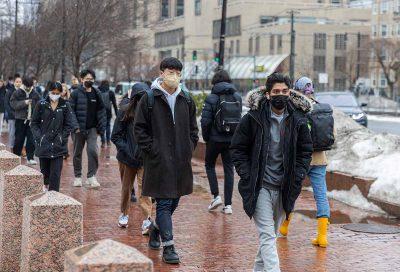
State-funded financial aid in Massachusetts has decreased by 47% since 2001 — a stark contrast to the 15% increase nationwide — placing Massachusetts 37th in the nation when it comes to state-funded financial aid, according to a recent report by the Hildreth Institute.
The Hildreth Institute is a research and policy center, “dedicated to restoring the promise of higher education as an engine for upward mobility for all,” according to the mission statement on their website.
Bahar Akman Imboden, author of the report and the managing director of the Hildreth Institute, told the Daily Free Press she believes underfunding creates a difficult system for students to navigate, resulting in many students having unmet financial needs.
“Through a lot of conversations with people working within the government … we quickly realized that the complexity is actually the result of a lack of funding,” Imboden said.
In 1988, Massachusetts’ largest need-based grant — the MASSGrant — covered 80% of tuition and fees at public universities, whereas today, the MASSGrant covers just 8% to 11% of tuition and fees across the state, according to the report.
With the cost of attendance rising at many of Massachusetts’ public universities and community colleges, Imboden said she believes the “ideal scenario” is to have students graduating public higher education without student loans to repay.
“It’s ambitious, but we do believe that if we are serious about redressing the unequal wealth distribution, especially along racial lines that we are witnessing in Massachusetts, addressing student debt is key because what we are seeing is that those who are most disadvantaged are having to borrow loans,” Imboden said.
The report also highlights what it calls the “inequitable distribution of state-funded aid,” explaining that in 2021, of the $34 million in state-funded financial aid going to private institutions, nearly half went to 10 private institutions alone.
Some of these private institutions include Boston University, Harvard University, Massachusetts Institute of Technology and Boston College — with endowments totaling tens of billions of dollars.
The report said that by providing community college students with adequate financial aid and “robust” services, Massachusetts could not only increase completion rates for students, but also see higher returns on taxpayer-funded programs and support workforce development.
“Most importantly, it would be a critical step to close persistent achievement gaps and provide an opportunity for upward mobility for thousands of students,” the report said.
The report highlights four main consequences, including growing financial unmet need, growing student debt burden, growing education gaps and a negative impact on the economy as a whole.
“The number of Massachusetts students graduating with debt from one of the state’s public colleges or universities has significantly grown in the last decade: a 105 percent increase among students graduating with a Bachelor’s Degree and a 45 percent increase among those graduating with an Associate’s Degree,” the report said.
The report said Massachusetts students face the fifth highest debt burden in the country, something that Imboden called a snowball effect on wealth accumulation for students.
“The impact of student debt on wealth accumulation is extremely disabling those who actually need higher education to access that upward social mobility and economic mobility,” Imboden said.
The United Negro College Fund (UNCF) is a nonprofit organization focused on helping young people of color get through college as well as supporting historically Black colleges through unrestricted funding.
Diego Aviles, the vice president of development for UNCF Northeast division, said the organization works with external partners to provide financial aid services to students that are in need.
“In the last three years, we’ve been able to grow the amount of partnerships here in the area to ensure that more students are able to achieve a college degree,” Aviles said.
Aviles also shared news of a $190 million investment in UNCF by Fidelity Insurance to help send nearly 2,500 students to college on scholarships worth $55,000 per year for four years.
Imboden said there is a common misconception with students who hold debt, saying although students may have to borrow in order to pay for their education, this does not mean they are fiscally irresponsible.
“It would be great if we had a little more compassion [for] people who can be different than us and face other barriers than our own,” she said.
The Massachusetts office of student financial assistance did not respond to comment.




